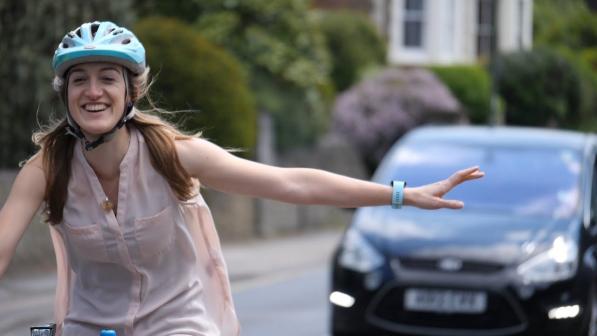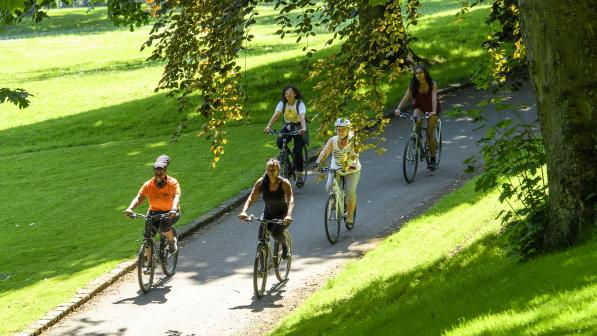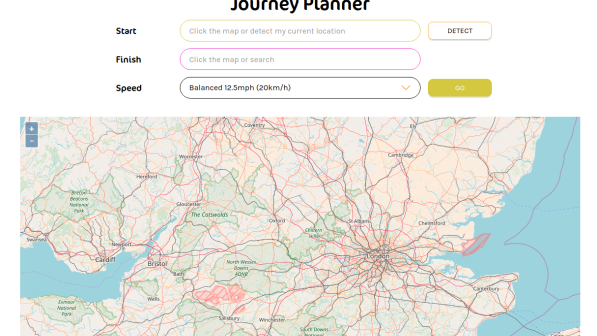Sir Chris Whitty wants more people cycling as the Chancellor ignores active travel

On Wednesday 23 March, two well-known public and political figures took to the public stage, but with two very different outlooks towards the future.
Chancellor Rishi Sunak stepped up to the Despatch Box in the House of Commons to deliver a Spring Statement. He outlined a spending plan which sought to address the issues facing the UK today.
At the same time he ignored the future, and in the words of Cycling UK’s head of campaigns Duncan Dollimore, provided, “a sticking plaster for the problems we face today.”
An hour earlier, Professor Sir Chris Whitty, the government’s chief medical officer had addressed the Local Government Association and the Association of Directors of Public Health’s annual Public Health Conference.
Speaking to the gathered health professionals about the impending obesity endemic facing the UK, he looked and learned from the past, addressed the present and outlined a solution for the future.
Both the Chancellor and the Chief Medical Officer in their speeches looked to the way the nation travels.
For the Chancellor this involved looking only to motor vehicles, introducing a Fuel Duty cut of 5p per litre for the next 12 months.
This is ultimately a short-term measure designed to alleviate the pain at the pump many households are currently facing. The New Economics Foundation argues it will only benefit the wealthiest fifth of households which spend almost five times as much on fuel as the poorest fifth.
The Chancellor’s Spring Statement shows lessons have not been learned from the past or our current situation, and demonstrates little vision on how to solve our transport problems
Duncan Dollimore, Cycling UK's head of campaigns
While the cut will undeniably be welcome in many households, it does nothing to address the underlying problem: most people feel there is no alternative to driving.
With 68% of all journeys under five miles driven in England, distances in many cases easily cycled or walked, it is clear as a society we are increasingly locked into car-dependency.
The Chancellor’s approach consolidates this problem, resulting in further negative health and environmental impacts which we will all have to pay for in the years to come.
Over to Cycling UK’s Duncan Dollimore for his frank assessment of the Spring Statement.
“The cost of living crisis has brought the lack of transport alternatives apart from the car into sharp relief, with people paying the penalty at the pump,” said Duncan. “The Chancellor’s Spring Statement shows lessons have not been learned from the past or our current situation, and demonstrates little vision on how to solve our transport problems.
“Now’s the time to plan for the future, to invest in our towns and cities in ways which will unlock our car dependency. Cars have their place, but when 68% of journeys under five miles are currently driven – distances easily cycled or in some cases walked – it’s clear there has been a failure to provide suitable transport alternatives.”
Professor Sir Chris Whitty’s approach was in stark contrast to the Chancellor’s.
He looked to the transport habits of the 1950s, when more people travelled actively and cycled to work. He looked to the increase of cycling and walking during the pandemic. And he looked to the future and threat of an obesity endemic and cycling’s role in addressing that.
According to PA Media, Sir Chris said: “During the last two years, obesity, particularly in children has got significantly worse.”
“One of the things that is the most effective ways of improving health – whether it’s cardiovascular, cancer or mental health – is physical exercise.
“And active transport is a particularly important way to do this because it builds it into people’s normal routines of daily life, rather than being seen as something that is separate.
"[A]ctive transport is a particularly important way to [improve public health] because it builds it into people’s normal routines of daily life, rather than being seen as something that is separate.
Prof Sir Chris Whitty, chief medical officer
“I think there’s often a feeling that it’s going to be very hard work to get people to, for example, take up cycling (but) if you went back to the ’50s and ’60s there were extremely high rates of people cycling for work as well as recreationally across the country and then they fell away.”
The decline in cycling came about as people were provided with a new alternative: the affordable private motor vehicle. With more people able to afford cars, understandably more people took to driving and using this alternative.
A culture largely dependent on cars grew as public transport provision diminished, and with more vehicles on the road and consequentially an increasing view that cycling was risky, active travel in turn diminished.
The Chancellor’s short termism approach is symptomatic of that car centric culture from the past, and does not really look beyond it. If the Chancellor could see beyond the problems of today, we would have had promises of investment in alternatives so people would not feel they have to drive everywhere – especially for shorter journeys.
That would mean increased investment in public transport and also active travel, as Duncan points out, “A progressive Spring Statement would have invested in cycling, walking and public transport for the future and not been a sticking plaster for the problems we face today.”
Driving is not going to go away, and for many people and many longer journeys it is the most viable and efficient means of transport. However, for shorter journeys most people could travel actively, and in turn we, society, would benefit.
This is something encouraging Sir Chris recognises when he said: “What happened during the Covid crisis is that we saw many local authorities being extremely imaginative in the way that they made it easier for people to walk and cycle to work, to shops as well as recreationally – largely as a way of trying to get people off public transport where they could pass on or acquire Covid.
“But what this demonstrates is what can be done and there’s a lot that could be done in every area of the country.”
While the Chancellor might be ignoring the benefits of a balanced transport system, we’re fortunate there are influential figures, like Sir Chris, recognising and championing the benefits of active travel.
We shouldn’t be entirely disheartened by the Chancellor’s lack of vision. Though he is one of the most important political figures at a national level, wherever you live in the UK, it is your local politicians who make the decisions about your local transport networks.
This May, across Northern Ireland, Scotland, Wales and parts of England we all have an opportunity to show our next local decision makers the importance and benefit of cycling.
You can support Cycling UK’s call for better cycling and walking with our Elections 2022 campaign.


